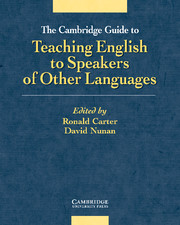Book contents
- Frontmatter
- Contents
- List of figures
- List of abbreviations
- Acknowledgements
- List of contributors
- Introduction
- Chapter 1 Listening
- Chapter 2 Speaking
- Chapter 3 Reading
- Chapter 4 Writing
- Chapter 5 Grammar
- Chapter 6 Vocabulary
- Chapter 7 Discourse
- Chapter 8 Pronunciation
- Chapter 9 Materials development
- Chapter 10 Second language teacher education
- Chapter 11 Psycholinguistics
- Chapter 12 Second language acquisition
- Chapter 13 Bilingualism
- Chapter 14 Sociolinguistics
- Chapter 15 Computer-assisted language learning
- Chapter 16 Observation
- Chapter 17 Classroom interaction
- Chapter 18 English for academic purposes
- Chapter 19 English for specific purposes
- Chapter 20 Assessment
- Chapter 21 Evaluation
- Chapter 22 Syllabus design
- Chapter 23 Language awareness
- Chapter 24 Language learning strategies
- Chapter 25 Task-based language learning
- Chapter 26 Literature in the language classroom
- Chapter 27 Genre
- Chapter 28 Programme management
- Chapter 29 Intercultural communication
- Chapter 30 On-line communication
- Postscript: The ideology of TESOL
- Glossary
- References
- Index
Chapter 11 - Psycholinguistics
Published online by Cambridge University Press: 07 September 2010
- Frontmatter
- Contents
- List of figures
- List of abbreviations
- Acknowledgements
- List of contributors
- Introduction
- Chapter 1 Listening
- Chapter 2 Speaking
- Chapter 3 Reading
- Chapter 4 Writing
- Chapter 5 Grammar
- Chapter 6 Vocabulary
- Chapter 7 Discourse
- Chapter 8 Pronunciation
- Chapter 9 Materials development
- Chapter 10 Second language teacher education
- Chapter 11 Psycholinguistics
- Chapter 12 Second language acquisition
- Chapter 13 Bilingualism
- Chapter 14 Sociolinguistics
- Chapter 15 Computer-assisted language learning
- Chapter 16 Observation
- Chapter 17 Classroom interaction
- Chapter 18 English for academic purposes
- Chapter 19 English for specific purposes
- Chapter 20 Assessment
- Chapter 21 Evaluation
- Chapter 22 Syllabus design
- Chapter 23 Language awareness
- Chapter 24 Language learning strategies
- Chapter 25 Task-based language learning
- Chapter 26 Literature in the language classroom
- Chapter 27 Genre
- Chapter 28 Programme management
- Chapter 29 Intercultural communication
- Chapter 30 On-line communication
- Postscript: The ideology of TESOL
- Glossary
- References
- Index
Summary
Introduction and background
Among the disciplinary hybrids of linguistics which have emerged as new fields of language study over the past decades, few embrace a wider range of inquiry than psycholinguistics. There are several ways this claim can be documented. For one thing, the field itself goes by at least three different names: psycholinguistics (reflecting an emphasis on units of language posited by linguists), the psychology of language (which, as implied, focuses more on using language to validate psychological constructs) and cognitive science (a newer and much broader term, encompassing such disparate fields as artificial intelligence and neurology, which uses language data to help construct a model of human cognition). Cognitive science is also used as a superordinate term to embrace psycholinguistics, psychology of language and other related approaches to linguistics.
Another measure of the diversity of psycholinguistic research is the variety of topics found in most introductory texts: everything from chimps to Chomsky, from brains to baby talk, from meaning to memory, from prototypes to parameters, and from sign language to slips of the tongue. Yet another demonstration of the field's breadth is the way psycholinguists keep appropriating new areas of linguistics for research, thus implicating trends for research in the twenty-first century. For example, one well-known investigator, whose early work was based heavily on psychology (Clark and Clark 1977), has written a recent book which concentrates almost exclusively on how pragmatics and deixis relate to psycholinguistic inquiry (Clark 1996).
- Type
- Chapter
- Information
- Publisher: Cambridge University PressPrint publication year: 2001



